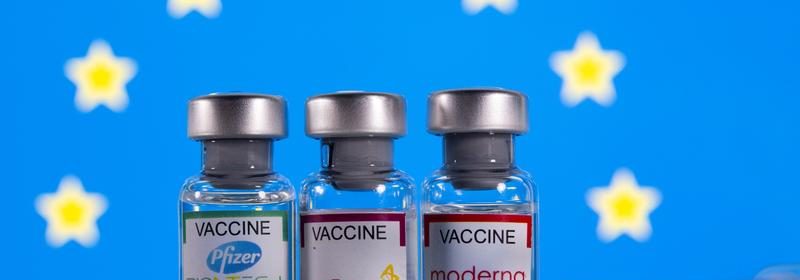EU to extend vaccine export curbs to cover backloading, Britain: source

BRUSSELS (Reuters) – The European Commission will on Wednesday extend EU powers to potentially block COVID-19 vaccine exports to Britain and other areas with much higher vaccination rates, and to cover instances of companies backloading contracted supplies, an EU official said.
The move is designed to avoid even limited shortfalls in deliveries to a region whose inoculation programme has been beset by delays and supply issues.
The amendment covering instances of companies backloading contracted quarterly deliveries into the bloc could hit Johnson & Johnson, which has announced delays in its supplies to the EU in the second quarter, the official said.
All vaccine makers could be affected if they do not comply with delivery timetables, the official said.
The EU this month used an existing export control mechanism, set up at the end of January, to block a shipment of AstraZeneca vaccine to Australia.
That mechanism can at present be activated only if companies do not meet contracted quarterly delivery targets. The AstraZeneca exports were blocked after the company announced steep cuts in first quarter deliveries to the EU.
With the amendments to be adopted on Wednesday, the EU will however be able to block exports to cover companies that respect their quarterly contracts but backload supplies to the end of the period, said the official, who asked to remain anonymous.
Johnson & Johnson, which has committed to delivering 55 million doses to the EU between April and June, has said its deliveries were likely to start in the second half of April.
The company told EU officials it was facing production issues that might make it difficult to meet its second quarter target, but that was striving to fulfil it. .
Moderna and Pfizer/BioNTech also had delays in their vaccine delivery rollouts to the EU, though they are set to meet their overall targets for the first quarter.
“We don’t want the same delays to happen in the second quarter,” said the official, who has direct knowledge of the Commission decision.
Any decision to bloc an export would however need to be taken in agreement with the EU state from where the shipment would leave the bloc, and take into account the overall stance of a company and of the importing state. “We will balance things out,” the official said.
The new rules will also allow to block exports to countries with a much higher vaccination rate than the EU, like for instance at the moment Britain or the United Arab Emirates, the official said, confirming what Commission head Ursula von der Leyen told a news conference last week.
Shipments could also be withheld if vaccine-producing countries, such as the United States and Britain, do not allow export of vaccines to the EU, the official added, also in line with von der Leyen’s earlier announcement.
The U.S. administration told EU officials in March that it would not allow any time soon the shipment to the EU of Astrazeneca vaccines produced in the United States, EU officials told Reuters.
The new rules, which will take effect immediately after publication in the EU official journal, will also tighten controls to make sure export blocks are not circumvented using third countries, the official said.
Source: Read Full Article
